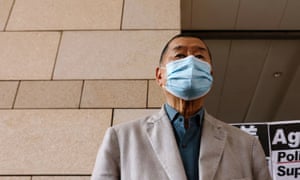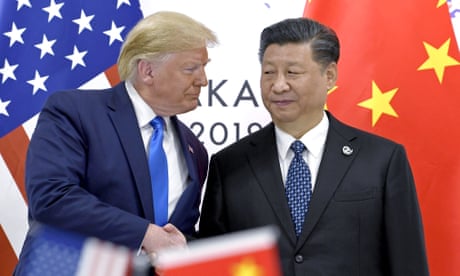pro-democracy Asian figures
Hong Kong tycoon and dissidents praise US president’s hardline approach towards China but others dispute its authenticity
Emma Graham-Harrison
Sun 1 Nov 2020 THE GUARDIAN

Hong Kong tycoon and dissidents praise US president’s hardline approach towards China but others dispute its authenticity
Emma Graham-Harrison
Sun 1 Nov 2020 THE GUARDIAN

Media mogul Jimmy Lai praised Donald Trump in an editorial of his Apple Daily newspaper. Photograph: Tyrone Siu/Reuters
Jimmy Lai, Hong Kong media tycoon and one of the most prominent pro-democracy figures in the city, waded into the US election in its final days, with an enthusiastic endorsement of the incumbent in his Apple Daily newspaper.
“I find a stronger sense of security in [Donald] Trump,” he wrote in an editorial that praised the US president for his “hardline” approach to Beijing.
His position is echoed by many in Hong Kong’s increasingly battered pro-democracy movement, across Taiwan and among many exiled Chinese dissidents living in America, including blind lawyer Chen Guangcheng, who endorsed Trump at the Republican national convention.
The US president might not seem like a natural ally for pro-democracy campaigners after years of public support for strongmen and dictators, undermining the press at home, and even attacking domestic protesters as “rioters”.
At a time of increased hate attacks on Asian Americans he has also used racist rhetoric about Covid-19, describing it as “kung flu” and the “China virus”. Advocacy groups have warned Trump’s language could have dangerous consequences.
But Lai and others who want democracy for China see in Trump’s unpredictable approach to foreign policy, and his escalating confrontations with Beijing, their greatest hope of challenging Chinese Communist party rule.
Jimmy Lai, Hong Kong media tycoon and one of the most prominent pro-democracy figures in the city, waded into the US election in its final days, with an enthusiastic endorsement of the incumbent in his Apple Daily newspaper.
“I find a stronger sense of security in [Donald] Trump,” he wrote in an editorial that praised the US president for his “hardline” approach to Beijing.
His position is echoed by many in Hong Kong’s increasingly battered pro-democracy movement, across Taiwan and among many exiled Chinese dissidents living in America, including blind lawyer Chen Guangcheng, who endorsed Trump at the Republican national convention.
The US president might not seem like a natural ally for pro-democracy campaigners after years of public support for strongmen and dictators, undermining the press at home, and even attacking domestic protesters as “rioters”.
At a time of increased hate attacks on Asian Americans he has also used racist rhetoric about Covid-19, describing it as “kung flu” and the “China virus”. Advocacy groups have warned Trump’s language could have dangerous consequences.
But Lai and others who want democracy for China see in Trump’s unpredictable approach to foreign policy, and his escalating confrontations with Beijing, their greatest hope of challenging Chinese Communist party rule.

“The Trump administration might be the hand that eventually pushes China to democracy,” dissident Wang Juntao, who fled into exile after the crackdown in Tiananmen Square in 1989, told local New York paper The City.
In Taiwan a recent poll found that independence-leaning Taiwanese back Trump strongly. 80% of Democratic Progressive party supporters wanted US voters to return him to office, the Taiwan Times reported.
These enthusiastic Trump supporters are motivated by the president’s turn away from decades of US engagement with Beijing, rather than his personal politics, said Steve Tsang, director of the SOAS China Institute in London.
“They are focusing much more on confronting the challenges posed by the Communist party of China than they are focusing on the principles of democracy and human rights,” Tsang said.
Since Nixon, US presidents had all “to slightly different extents, belonged to the school of engagement with China”, Tsang added. Trump began his presidency with a similar approach, so keen to strike a trade deal that he held off taking action over human rights abuses in Xinjiang to smooth negotiations.
But amid escalating tensions over everything from the coronavirus to the economy and allegations of industrial espionage, he has broken definitively with that tradition, deploying the strongest rhetoric on China since the early days of the cold war.
Trump has also brought in a series of sanctions over alleged abuses in Hong Kong and Xinjiang, boosted diplomatic and military support for self-ruled Taiwan, and challenged Chinese-owned tech firms operating in the US.
For prominent figures like Lai, that has meant support for both his cause, and him personally. When the tycoon was arrested by Hong Kong authorities in August, Trump denounced the detention as “a terrible thing”.
Lai’s media empire has even been accused of trying to actively meddle in the US election. He recently apologised for the role the Apple Daily played in a report on Hunter Biden’s alleged Chinese business links.
He admitted funds from his private firm had been used to pay for it, but said he personally had “nothing to do” with its commissioning or dissemination.
Support for Trump is far from universal among critics of China, however. Kevin Yam, a Hong Kong-based lawyer, is among those who argue that the lure of a hardline stance against Beijing is superficial, and the president’s position on other issues will ultimately undermine everything they are fighting for.
“I dispute the very idea that Trump is ‘tough on China’ given his record, and his words and deeds make it hard for him to have credibility when pushing a human rights agenda around the world,” said Yam who laid out his concerns in an editorial for Ming Pao and said he was showered with abuse when it came out.
“If an anti-universal values power ‘beats’ another, that’s not a triumph for freedom, it’s just Orwellian Nineteen Eighty-Four-style endless mutual destruction as between hegemons,” he wrote in an English language summary of his argument on Twitter.
In the US, another Tiananmen Square dissident, Wan Yanhai is campaigning hard against the incumbent, and says he too has faced verbal abuse and even a death threat, but is determined to continue.
“Trump has inflicted major damage on democracy,” he told The City. “You want to fight against the CCP [Chinese Communist party], but you shouldn’t expect one monster to eat another monster.”
No comments:
Post a Comment